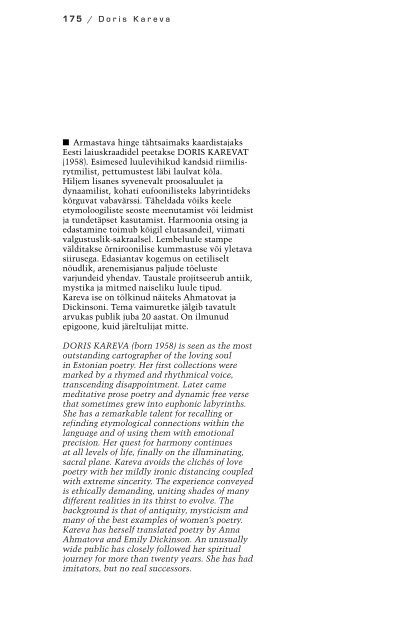*tuule makett - Infopoint Estonian Culture
*tuule makett - Infopoint Estonian Culture
*tuule makett - Infopoint Estonian Culture
You also want an ePaper? Increase the reach of your titles
YUMPU automatically turns print PDFs into web optimized ePapers that Google loves.
1 7 5 / Doris Kareva<br />
■ Armastava hinge tähtsaimaks kaardistajaks<br />
Eesti laiuskraadidel peetakse DORIS KAREVAT<br />
(1958). Esimesed luulevihikud kandsid riimilisrytmilist,<br />
pettumustest läbi laulvat kõla.<br />
Hiljem lisanes syvenevalt proosaluulet ja<br />
dynaamilist, kohati eufoonilisteks labyrintideks<br />
kõrguvat vabavärssi. Täheldada võiks keele<br />
etymoloogiliste seoste meenutamist või leidmist<br />
ja tundetäpset kasutamist. Harmoonia otsing ja<br />
edastamine toimub kõigil elutasandeil, viimati<br />
valgustuslik-sakraalsel. Lembeluule stampe<br />
välditakse õrniroonilise kummastuse või yletava<br />
siirusega. Edasiantav kogemus on eetiliselt<br />
nõudlik, arenemisjanus paljude tõeluste<br />
varjundeid yhendav. Taustale projitseerub antiik,<br />
mystika ja mitmed naiseliku luule tipud.<br />
Kareva ise on tõlkinud näiteks Ahmatovat ja<br />
Dickinsoni. Tema vaimuretke jälgib tavatult<br />
arvukas publik juba 20 aastat. On ilmunud<br />
epigoone, kuid järeltulijat mitte.<br />
DORIS KAREVA (born 1958) is seen as the most<br />
outstanding cartographer of the loving soul<br />
in <strong>Estonian</strong> poetry. Her first collections were<br />
marked by a rhymed and rhythmical voice,<br />
transcending disappointment. Later came<br />
meditative prose poetry and dynamic free verse<br />
that sometimes grew into euphonic labyrinths.<br />
She has a remarkable talent for recalling or<br />
refinding etymological connections within the<br />
language and of using them with emotional<br />
precision. Her quest for harmony continues<br />
at all levels of life, finally on the illuminating,<br />
sacral plane. Kareva avoids the clichés of love<br />
poetry with her mildly ironic distancing coupled<br />
with extreme sincerity. The experience conveyed<br />
is ethically demanding, uniting shades of many<br />
different realities in its thirst to evolve. The<br />
background is that of antiquity, mysticism and<br />
many of the best examples of women’s poetry.<br />
Kareva has herself translated poetry by Anna<br />
Ahmatova and Emily Dickinson. An unusually<br />
wide public has closely followed her spiritual<br />
journey for more than twenty years. She has had<br />
imitators, but no real successors.


